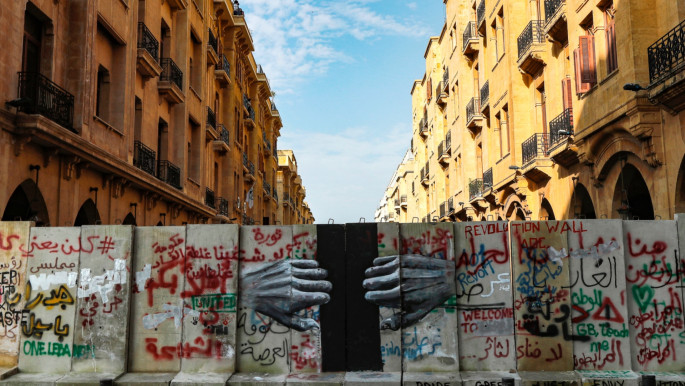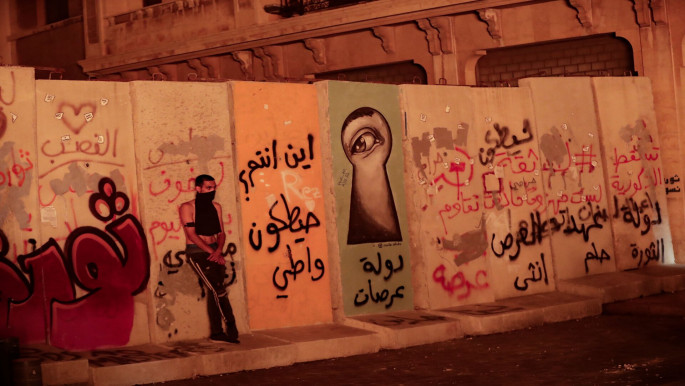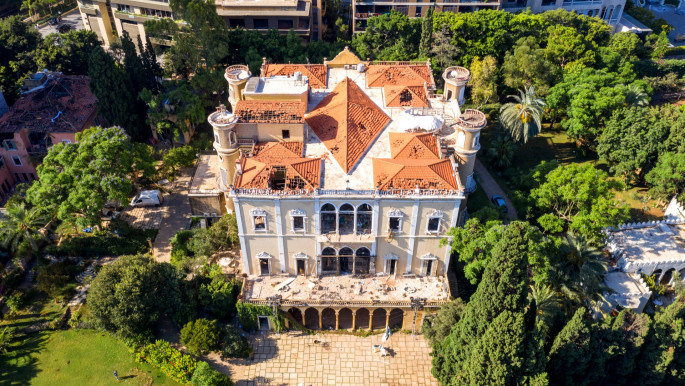Hariri's comeback met with scorn and apathy in Lebanon
Well, not in Lebanese politics, where three-time former PM Saad Hariri is back by unpopular demand after winning the backing of a narrow majority, almost exactly a year after he resigned amidst an unprecedented civil uprising.
The Lebanese find themselves trapped yet again in a grim version of the 1993 film Groundhog Day, only rather than being forced to relive the same day, they can't escape the vicious cycle in which they have been held hostage by the same ruling class for decades.
'A natural candidate'
At the time of his resignation on 29 October last year, Hariri - whose powerful position in Lebanon's political landscape, which he is utterly unqualified for, epitomises the country's corrupt and completely ineffective ruling class - claimed to have done so "in response to the will and demand of the thousands of Lebanese demanding change."
But after keeping a relatively low profile since then, he suddenly reappeared with a vengeance, through a carefully calculated PR tour de force, having seemingly forgotten all about the will and demand of those same Lebanese.
 |
This is not a long-term solution, just a band aid on a much larger wound |
 |
"I am the natural candidate for prime minister," he suddenly announced in the political talk show 'Sar el Waet', after months of denying that he was even considering such a move.
While Hariri can still count on the support of many, especially in Sunni strongholds such as Tripoli (where celebratory gunfire injured at least 7 people), Saida and Beiruti neighborhoods such as Tariq al Jdeideh, his return was mostly seen as a cementing of the status quo and, especially by protesters, as a stab in the back.
 |
|
| Read more: Lebanon's lost generation grapples with a bleak future |
"What natural candidate?" sneers Fadi, an electrician, in a coffeeshop in Hariri stronghold Tariq al Jdeideh while angrily pulling on his cigarette. "Just because he is the son of (slain former PM) Rafik? If only his father could see him now, he'd roll around in his grave."
While Fadi says that, although he knows that Rafik Hariri was corrupt too ("they all are, my love"), as it's impossible to be part of Lebanon's elite without having at least some pecuniary skeletons in your closet, at least back then Lebanon was thriving.
"Under Rafik we had jobs and money. Life wasn't miserable as it is now. Sure, he stole from us, too, but at least we profited a little bit. Thanks to his son we don't even get crumbs."
Calculated scheme?
While Hariri's comeback was inexplicably met with surprise by some, most see Hariri's resignation last year followed by seemingly stepping away only to suddenly catapult himself back into the limelight as a maliciously calculated scheme, a way to garner sympathy by playing the martyr, only to then reappear as the savior.
Planned or not, the main consensus among both citizens and experts seems to be that it's grotesquely naive to expect that the same ruling class that willfully ran the country into the ground would somehow suddenly be capable or even willing to come to its rescue.
 |
Hariri is the real face of the ruling sectarian neoliberal regime, and since they are still in power it is no surprise that he is back |  |
"Hariri is the real face of the ruling sectarian neoliberal regime, and since they are still in power it is no surprise that he is back," Rima Majed, associate professor of Sociology at the American University of Beirut, told The New Arab.
"Of course, it is pre-meditated but I think this is the French role specifically. While many people in Lebanon were, I would say naively, enthusiastic about Macron's interference as a savior, it has now become clear that if France saved anyone, it precisely saved the old regime of sectarian leaders," Majed adds.
As for what Hariri's new term will bring, Majed says she believes that, despite the return of Hariri, the Taif regime is over [referring to the status quo regime constituted through the 1989 Taif Accord, which formally ended the civil war] which means that it will be difficult to govern without a constitutional change. "How this change will come about, with violence or not; and under whose patronage, is yet to be seen," says Majed.
 |
|
| Read more: Lebanon's revolution: How art turned into a political weapon |
Nadim El Kak, researcher at the Lebanese Center for Policy Studies, warns that, although the status quo might, for now, be Lebanon's best (and only) bet to unlock foreign funds by signing onto the IMF deal, people shouldn't overestimate what said deal would actually mean for the Lebanese people.
"We know that those in power are incapable of governing in a manner that actually upholds the interests of the Lebanese people," El Kak says. As Lebanon's ruling class only uses state institutions to further reproduce their clientelistic networks, and there's nothing that indicates that they are capable of doing anything else, any kind of reform outlined by the French initiative will be purely cosmetic, according to El Kak. "This is not a long-term solution, just a band aid on a much larger wound."
From street protests to organising
While many expected Hariri's return to cause mass protests to erupt again nationwide, they have as of yet failed to occur. But rather than seeing this as a tacit sign of acceptance or defeat, Majed points to the many accumulated burdens the Lebanese have been carrying since last year.
"The financial situation, the post-August 4 exhaustion, the peaks in covid cases, the feeling of defeat for many who expected a fast change, the migration of many…this doesn't necessarily mean that people will mobilize. It's a process and reactions will come one way or another."
 |
We know that those in power are incapable of governing in a manner that actually upholds the interests of the Lebanese people |  |
Additionally, El Kak believes that many people at this point feel that protesting will not lead to tangible changes. "Right now people are organizing more on a community level, developing the kind of organizational structures that were lacking or weren't developed enough when the uprising started. "
Social media scorn, satire and solemnity
Lebanese Twitter had a field day after news broke of Hariri's reappointment, from fresh Hariri-specific takes on popular memes to other playful jabs at what is seen as Lebanese politics' perpetual recycling of the same old faces, many came together to, at least digitally, once again protest the man who they thought they had gotten rid of during the October uprising and collectively commiserate about the sad state of the country.
"Hariri is like every ex that cheats on you and then cries for a second chance," wrote producer/filmmaker Danny Zahalan, to the delight of many. The former and future PM was compared to a variety of other things that insinuated he was nothing more than a quick (and likely ineffective) fix: "Hariri is to Lebanon what Panadol was to the school nurse," jested Iman Feghaly to which another user responded "or 7Up to my grandma".
Twitter Post
|
Treasured Lebanese satirist (and architect) Karl Sharro, also known as Karlremarks on social media, poked fun of the length of the 'Hariri Dynasty' by doing some 'archeological digging'.
There were also plenty of variations on the 'recycling' theme, with quite a few Twitter users quipping "the only thing we recycle in Lebanon is Hariri," referring to Lebanon's perpetual waste management issues, widely regarded as a direct result of the corrupt and inept government. Ironically enough, a few days after Hariri's appointment, waste management company Ramco announce that it would stop collecting trash in Beirut, Metn and Kesrouan if the government does not agree to pay it in local dollars.
Twitter Post
|
Other reactions were more solemn in tone or even scathing indictments of the fact that almost three months after the devastating port explosion, nothing had been done by the same ruling class that many hold responsible for it, Hariri included.
Halim Shebaya, interim Executive Director at the Arab Association of Constitutional Law, expressed a sentiment on Twitter that resonated with many. "I don't care about Hariri, the next government or the names of ministers. One thing I can't get over is a huge explosion that took place on 4/8 that destroyed a city, left children w/out their parents (& vice-versa) and that has completely become a secondary issue at this stage."
 |
|
| Read more: The battle to save Beirut's unique architectural heritage |
A really bad nightmare
The Beirutis who spoke to The New Arab were completely unconvinced that Hariri would be able or even willing to make any significant changes that would benefit anyone other than himself and the rest of the ruling class. All over the city, people's reactions oscillated between despair and despondency, often accompanied by what can only be described as a collective sigh-cum-eye roll.
"As we say here 'Atal l atil w meshe bi jnezto' [he killed the victim and walked in his funeral], out-of-work Fouad says slightly sardonically, while buying cigarettes at a cornershop in Mar Elias, referring to what he perceives to be Hariri's stunning hypocrisy.
In Geitawi, one of the hardest hit neighborhoods in the horrifying port explosion, Sana stares up at her still destroyed building while walking her dog. "How can we ever trust those that did this to us again? I'm sick of looking at those same faces. It just all feels like a really bad nightmare that we will never wake up from."
Follow her on Twitter: @FarahKanaan





 Follow the Middle East's top stories in English at The New Arab on Google News
Follow the Middle East's top stories in English at The New Arab on Google News


